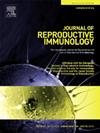Endoplasmic reticulum stress and unfolded protein response play roles in recurrent pregnancy loss: A bioinformatics study
IF 2.9
3区 医学
Q3 IMMUNOLOGY
引用次数: 0
Abstract
This study aims to explore whether endoplasmic reticulum stress (ERS) and unfolded protein response (UPR) processes could be potential targets for preventive, diagnostic, and therapeutic for recurrent pregnancy loss (RPL). RPL datasets GSE165004 and GSE26787 were sourced from the GEO database, and ERS- and UPR-related gene sets were obtained from the MsigDB database. After differentially expressed genes (DEGs) identification, key genes were screened from intersecting DEGs in RPL-ERS and RPL-UPR datasets. The z-score algorithm was conducted to obtain phenotype scores. Functional enrichment and machine learning analyses were performed to assess gene function and diagnostic value evaluation. Interaction networks were conducted to investigate upstream regulated relationships of the key genes. Immune infiltration and single-cell RNA sequencing (scRNA-seq) were assessed to explore ERS and UPR functions at the cellular level. Totally 25 key genes RPL-ERS DEGs and 16 key genes RPL-UPR DEGs were identified. Among them, six key genes (NFYB, EXOSC2, UBQLN2, RNF139, DERL1, and FBXO27) were validated to show consistent expression trends in both RPL datasets. Functional enrichment highlighted their involvement in the immunity of RPL. Machine learning indicated the significant diagnostic value of these validated genes for RPL, with an accuracy rate of > 80 %. scRNA-seq analysis revealed elevated ERS and UPR expressions in monocytes/macrophages in RPL samples. In conclusion, ERS and UPR processes are associated with RPL occurrences, and were mainly upregulated in monocytes/macrophages within RPL samples. ERS and UPR processes may serve as potential targets for the prevention, diagnosis, and treatment of RPL.
内质网应激和未折叠蛋白反应在复发性流产中起作用:一项生物信息学研究
本研究旨在探讨内质网应激(ERS)和未折叠蛋白反应(UPR)过程是否可能成为复发性妊娠丢失(RPL)预防、诊断和治疗的潜在靶点。RPL数据集GSE165004和GSE26787来源于GEO数据库,ERS和upr相关基因集来源于MsigDB数据库。鉴定差异表达基因(deg)后,从RPL-ERS和RPL-UPR数据集中的交叉deg中筛选关键基因。采用z-score算法获得表型评分。功能富集和机器学习分析用于评估基因功能和诊断价值评估。通过互作网络研究关键基因的上游调控关系。评估免疫浸润和单细胞RNA测序(scRNA-seq)以探索细胞水平上的ERS和UPR功能。共鉴定出25个关键基因RPL-ERS DEGs和16个关键基因RPL-UPR DEGs。其中,6个关键基因(NFYB、EXOSC2、UBQLN2、RNF139、DERL1和FBXO27)在两个RPL数据集中的表达趋势一致。功能富集突出了它们与RPL免疫的关系。机器学习显示了这些验证基因对RPL的显著诊断价值,准确率为>; 80 %。scRNA-seq分析显示,RPL样品中单核/巨噬细胞中ERS和UPR表达升高。综上所述,ERS和UPR过程与RPL的发生有关,并且主要在RPL样本中的单核/巨噬细胞中上调。ERS和UPR过程可以作为预防、诊断和治疗RPL的潜在目标。
本文章由计算机程序翻译,如有差异,请以英文原文为准。
求助全文
约1分钟内获得全文
求助全文
来源期刊
CiteScore
6.30
自引率
5.90%
发文量
162
审稿时长
10.6 weeks
期刊介绍:
Affiliated with the European Society of Reproductive Immunology and with the International Society for Immunology of Reproduction
The aim of the Journal of Reproductive Immunology is to provide the critical forum for the dissemination of results from high quality research in all aspects of experimental, animal and clinical reproductive immunobiology.
This encompasses normal and pathological processes of:
* Male and Female Reproductive Tracts
* Gametogenesis and Embryogenesis
* Implantation and Placental Development
* Gestation and Parturition
* Mammary Gland and Lactation.

 求助内容:
求助内容: 应助结果提醒方式:
应助结果提醒方式:


